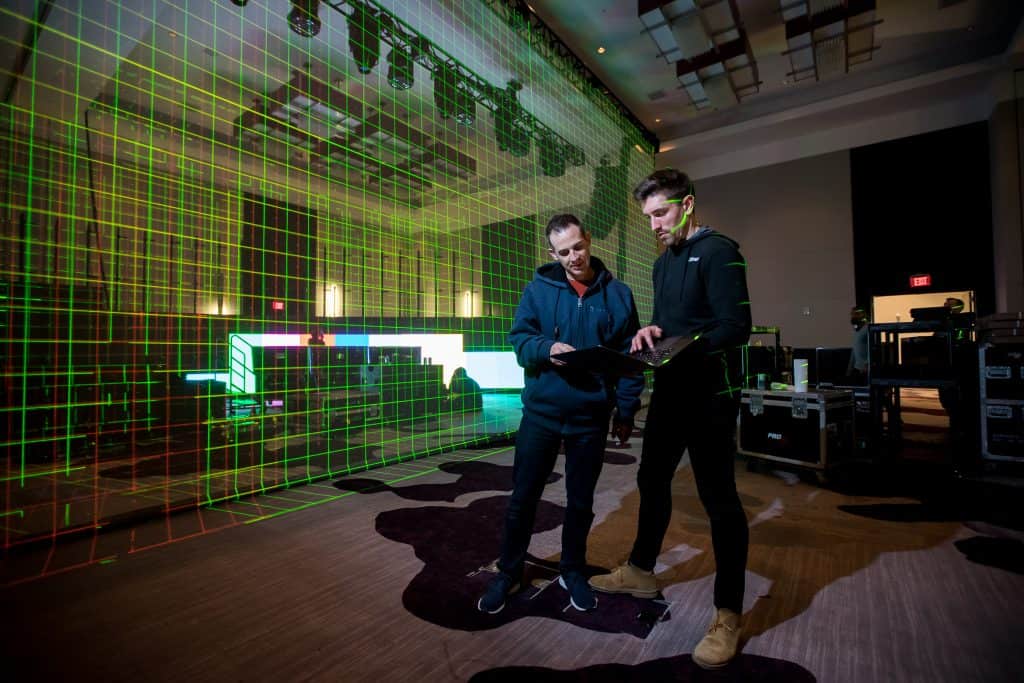What sets event production charlotte apart from self-managed events?
Comprehending Event Production: Why It Is Essential for Successful Celebrations
Event production plays an important duty in forming effective events. It involves cautious planning, coordination, and implementation to assure every information lines up with the event's vision. This procedure not only enhances guest experiences however also assists in purposeful connections among participants. Recognizing the intricacies of event production can substantially influence the overall end result. What are the crucial elements that add to a successful event, and just how can they be successfully taken care of?
The Duty of Event Production in Creating Unforgettable Experiences
Although several aspects add to the success of an occasion, event production plays a critical function in crafting memorable experiences. This diverse process includes various aspects, including preparation, logistics, and execution. Reliable event production warranties that every information straightens with the general vision, developing a seamless circulation that astounds participants. By collaborating timelines, taking care of sources, and supervising technical aspects, event manufacturers establish a foundation for impactful experiences.Moreover, they curate environments that resonate with the target audience, enhancing involvement and emotional link. From choosing appropriate locations to incorporating ingenious technology, the options made throughout production greatly influence exactly how participants perceive and remember the event. By prioritizing top quality and interest to information, event production changes average events into remarkable moments, leaving lasting perceptions. Inevitably, the experienced orchestration of these elements defines the essence of an event, showcasing the value of specialist event production in attaining exceptional end results.
Key Parts of Effective Event Production
Reliable event production depends upon several essential parts that assure success. Planning and control develop a solid foundation, while technical arrangement requirements address logistical requirements. In addition, applying target market interaction techniques enhances the general experience, making the event unforgettable.
Preparation and Sychronisation
Planning and sychronisation work as the backbone of successful event production, making certain that every information lines up effortlessly to produce an unforgettable experience. Effective planning involves developing a clear vision and objectives, while coordination entails the thorough organization of logistics, routines, and resources. A distinct timeline is necessary, assisting all stakeholders with important turning points and jobs. Interaction plays a critical duty, cultivating cooperation among employee, suppliers, and location staff. Regular meetings and updates assist to address difficulties promptly, guaranteeing that everyone continues to be aligned with the event objectives. Eventually, an organized approach to preparation and control not just boosts efficiency however likewise substantially adds to the general success and pleasure of the event for attendees and coordinators alike.
Technical Configuration Requirements
A successful event relies heavily on its technical arrangement requirements, which incorporate vital elements such as audio-visual devices, lighting, staging, and connection. Audio-visual equipment consists of microphones, speakers, and projectors, ensuring that presentations and performances are supplied plainly. Proper lights boosts the setting and highlights key areas, while presenting supplies the essential system for audio speakers and entertainers. Connectivity, including Wi-Fi and electric access, is essential for seamless communication and technology combination. Each element needs to be carefully intended and carried out, customized to the event's certain requirements. Inadequate technological setups can lead to disruptions, negatively affecting the general experience for attendees, highlighting the importance of extensive prep work and attention to detail in event production.
Audience Engagement Strategies

The Value of Preparation and Sychronisation
Preparation and coordination are essential to the success of any kind of event production. Reliable timeline management, source appropriation strategies, and group interaction characteristics play essential functions in ensuring that all aspects collaborated perfectly. Without an organized approach to these aspects, events run the risk of encountering delays, spending plan overruns, and miscommunication amongst staff member.
Efficient Timeline Management


While effective event production frequently hinges on imagination and execution, efficient timeline monitoring remains a crucial aspect that can not be forgotten. A well-structured timeline acts as the foundation of any type of event, making sure that each phase is implemented in a timely way. It enables the sychronisation of different tasks, from location configuration to visitor arrivals, while preventing possible traffic jams. By clearly outlining deadlines and duties, event planners can preserve focus and adjust to unpredicted obstacles. Additionally, a meticulously crafted timeline cultivates communication amongst staff member, promoting responsibility and partnership. Inevitably, reliable timeline monitoring not only enhances operational effectiveness yet also contributes considerably to the general success and smooth implementation of the event, leaving attendees with a remarkable experience.
Resource Appropriation Strategies
Effective resource allowance methods are vital for the successful implementation of any type of event. Proper preparation permits event organizers to identify and distribute resources, such as finances, workers, and products, in a fashion that makes best use of efficiency. By examining the certain requirements of each facet of the event, organizers can focus on tasks and allocate resources appropriately. Control among different divisions ensures that all components, from catering to audiovisual demands, are adequately sustained. This calculated approach not just lessens waste however also enhances the total experience for guests. In addition, preparing for possible obstacles and having backup plans in position permits for smoother procedures. Eventually, efficient source allocation adds substantially to attaining event goals and guaranteeing a memorable event.
Group Interaction Characteristics
Just how can seamless interaction amongst employee change the event production process? Effective communication is essential for collaborating jobs, sharing updates, and resolving challenges in real-time. When staff member involve in open discussion, they can promptly identify prospective concerns and create options collaboratively, decreasing hold-ups and misconceptions. This dynamic fosters a natural environment where every person comprehends their roles and duties, bring about a much more integrated effort. Furthermore, normal check-ins and comments loops enhance liability and assurance positioning with the event's goals. By prioritizing communication methods, teams can streamline process, bolster morale, and ultimately elevate the overall top quality of the event. Successful celebrations pivot on the capacity to connect successfully, making it a necessary part of event production.
Enhancing Attendee Engagement Through Innovative Style
Innovative style plays a critical function in boosting participant involvement at events, as it fosters an immersive setting that mesmerizes participants' interest. By integrating innovative visuals, interactive components, and thematic design, event planners can develop memorable experiences that resonate with click here for more info attendees. Thoughtful layout styles advertise movement and exploration, urging guests to communicate with display screens and each other.Incorporating innovation, such as augmented truth or live polling, additional enhances the experience, allowing for real-time comments and interaction. In addition, sensory aspects like illumination, noise, and aroma can evoke feelings and develop a more engaging atmosphere.The use of storytelling via layout helps communicate the event's function and message, making it more relatable for participants. Eventually, imaginative design not just improves interaction however also strengthens connections amongst participants, leaving a long-term impression that prolongs past the event itself. This critical method to design is vital for effective gatherings.
Managing Logistics for a Smooth Implementation
While the exhilaration of an event can draw guests in, taking care of logistics is crucial to safeguard a seamless execution. This entails meticulously collaborating different components, from location selection and format to event catering and transport. Efficient logistics administration guarantees that all components line up, permitting for a smooth circulation from registration to the verdict of the event.Additionally, a clear interaction plan amongst all stakeholders is vital. This consists of staff, vendors, and volunteers, that need to be educated of their roles and duties. Expecting potential challenges, such as devices failure or unanticipated climate condition, can even more improve the event's success.Creating a comprehensive timeline helps keep the group on track and permits timely changes. Eventually, well-managed logistics not only facilitate a satisfying experience for attendees yet also reflect the professionalism and trust and dependability of the organizers, adding to the general success of the gathering.

The Impact of Innovation on Event Production
What duty does innovation play in shaping contemporary event production? Modern technology has become a foundation of reliable event production, enhancing both preparing and implementation processes. From advanced registration systems to interactive applications, modern technology improves guest management and improves engagement. Digital event systems enable coordinators to reach wider target markets, damaging geographical barriers and promoting hybrid gatherings that integrate in-person and on-line experiences.Additionally, audiovisual innovations, such as high-definition displays and sound systems, raise the top quality of discussions and efficiencies, making sure an unforgettable experience for attendees - event production charlotte. Social media assimilation makes it possible for real-time feedback and communication, cultivating neighborhood involvement before, throughout, and after the event. Moreover, data analytics tools aid organizers in keeping track of participant actions and preferences, making it possible for customized experiences that resonate with varied audiences. On the whole, the integration of innovation in event production not just imp source improves operational effectiveness yet likewise enhances attendee experiences, inevitably adding to the success of the event
Evaluating Success: Measuring the Results of Your Event
Success in event production rests on efficient evaluation, which entails determining a selection of results to evaluate the total impact of an event. To accomplish this, coordinators can employ both qualitative and quantitative metrics. Quantitative procedures may include presence figures, ticket sales, and profits generated, while qualitative assessments might include participant complete satisfaction surveys and comments forms.Additionally, examining social media engagement and media coverage can offer insights into the event's reach and brand name influence. Contrasting these metrics against predefined goals aids establish if the goals were met.Furthermore, post-event debriefs with the planning team can reveal lessons found out and areas for enhancement. By systematically evaluating these end results, event manufacturers can improve future gatherings, ensuring continual development and success. Ultimately, an extensive assessment not just highlights success however likewise notifies strategic choices for subsequent events, fostering a culture of excellence in event production.
Regularly Asked Concerns
What Qualifications Should an Occasion Producer Have?
Event manufacturers ought to have strong business skills, creative thinking, and efficient communication capabilities. A background in job monitoring, budgeting, and settlement is important. Pertinent accreditations and experience in varied event types better enhance their certifications.
How Can I Minimize Event Production Prices Successfully?
To properly decrease event production costs, one can streamline supplier option, work out agreements, make use of in-house sources, focus on crucial aspects, carry out technology for effectiveness, and discover sponsorship opportunities to balance out costs without jeopardizing quality.
What Are the Common Obstacles in Event Production?
Typical obstacles in event production include spending plan constraints, logistical coordination, vendor monitoring, time constraints, attendee engagement, technical problems, and unpredicted situations - event production charlotte. Each aspect can substantially influence the overall success and smooth implementation of the event
Just how Do I Pick the Right Place for My Event?
Picking the right venue involves thinking about go to this site variables such as area, ability, amenities, and budget. Additionally, evaluating ease of access and setting guarantees the picked area lines up with the event's objectives and improves the general participant experience.
What Is the Common Timeline for Planning an Event?
The regular timeline for intending an occasion differs, however usually consists of phases such as idea advancement, venue selection, supplier control, promo, and last preparations, typically spanning several months to assure an effective execution.